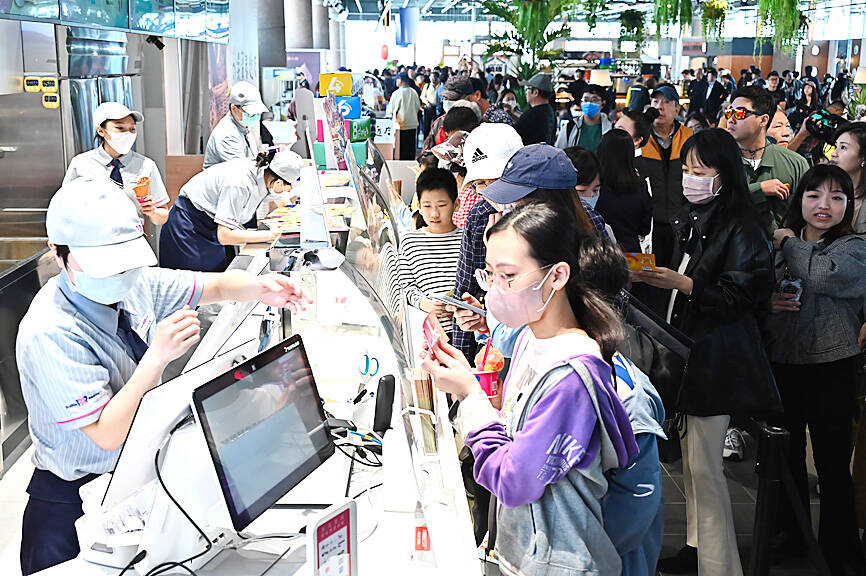Sales in the retail, and the food and beverage sectors in the first two months of this year rose to the highest for the period on record on the back of holiday shopping, the Ministry of Economic Affairs said yesterday.
Retail sales climbed 1.1 percent from a year earlier to NT$801.5 billion (US$24.23 billion) in the first two months, with vehicle and motorcycle vendors, drink and tobacco retailers, and pharmacies and cosmetics stores the main drivers, the ministry said in a report.
Food and beverage sales grew 4.1 percent in the period to NT$188.5 billion on across-the-board growth in restaurants, beverage outlets and catering service providers, the report said.

Photo: Lee Hui-chou, Taipei Times
The ministry released the data for the first two months to factor out the effects of the week-long Lunar New Year holiday — which was mostly in January this year, but was in February last year — when many businesses were closed.
However, the figures missed forecasts by the ministry, which had projected retail sales in the first two months to increase by 2.2 to 3.6 percent and by 5.1 percent to 6.6 percent in the food and beverage sector.
The ministry blamed the underperformance of the two sectors on an explosion at the Shin Kong Mitsukoshi Zhonggang department store in Taichung on Feb. 13, coupled with cold and wet weather, as well as a persistent tourism deficit.
This month, the ministry expects the two sectors to post annual sales growth, thanks to special sales promotions related to International Women’s Day, White Day — when men give reciprocal gifts to women who gave them Valentine’s Day gifts the month before — and other festive events, as well as the effects of new store openings and digital marketing strategies, the report said.
Retail sales are predicted to be between a 0.6 percent drop to a 2.4 percent gain from March last year to between NT$389.1 billion and NT$400.8 billion this month, while food and beverage sales are expected to increase 1.3 to 4.3 percent to between NT$84.2 billion and NT$86.7 billion, it said.
Sales generated by the wholesale sector increased 8.8 percent year-on-year to NT$2.14 trillion in the first two months, also the highest for the period and exceeding the ministry’s forecast of an annual increase of 3.9 to 5.2 percent, the report said.
The better-than-expected performance was mainly attributable to the machinery equipment industry, which posted a 21.2 percent year-on-year sales increase and registered its 14th consecutive month of growth, the report said.
For this month, sales for the wholesale sector are projected to increase 8 to 11 percent year-on-year to between NT$1.16 trillion and NT$1.19 trillion, the ministry added.

Merida Industry Co (美利達) has seen signs of recovery in the US and European markets this year, as customers are gradually depleting their inventories, the bicycle maker told shareholders yesterday. Given robust growth in new orders at its Taiwanese factory, coupled with its subsidiaries’ improving performance, Merida said it remains confident about the bicycle market’s prospects and expects steady growth in its core business this year. CAUTION ON CHINA However, the company must handle the Chinese market with great caution, as sales of road bikes there have declined significantly, affecting its revenue and profitability, Merida said in a statement, adding that it would

RISING: Strong exports, and life insurance companies’ efforts to manage currency risks indicates the NT dollar would eventually pass the 29 level, an expert said The New Taiwan dollar yesterday rallied to its strongest in three years amid inflows to the nation’s stock market and broad-based weakness in the US dollar. Exporter sales of the US currency and a repatriation of funds from local asset managers also played a role, said two traders, who asked not to be identified as they were not authorized to speak publicly. State-owned banks were seen buying the greenback yesterday, but only at a moderate scale, the traders said. The local currency gained 0.77 percent, outperforming almost all of its Asian peers, to close at NT$29.165 per US dollar in Taipei trading yesterday. The

RECORD LOW: Global firms’ increased inventories, tariff disputes not yet impacting Taiwan and new graduates not yet entering the market contributed to the decrease Taiwan’s unemployment rate last month dropped to 3.3 percent, the lowest for the month in 25 years, as strong exports and resilient domestic demand boosted hiring across various sectors, the Directorate-General of Budget, Accounting and Statistics (DGBAS) said yesterday. After seasonal adjustments, the jobless rate eased to 3.34 percent, the best performance in 24 years, suggesting a stable labor market, although a mild increase is expected with the graduation season from this month through August, the statistics agency said. “Potential shocks from tariff disputes between the US and China have yet to affect Taiwan’s job market,” Census Department Deputy Director Tan Wen-ling

UNCERTAINTIES: The world’s biggest chip packager and tester is closely monitoring the US’ tariff policy before making any capacity adjustments, a company official said ASE Technology Holding Inc (日月光投控), the world’s biggest chip packager and tester, yesterday said it is cautiously evaluating new advanced packaging capacity expansion in the US in response to customers’ requests amid uncertainties about the US’ tariff policy. Compared with its semiconductor peers, ASE has been relatively prudent about building new capacity in the US. However, the company is adjusting its global manufacturing footprint expansion after US President Donald Trump announced “reciprocal” tariffs in April, and new import duties targeting semiconductors and other items that are vital to national security. ASE subsidiary Siliconware Precision Industries Co (SPIL, 矽品精密) is participating in Nvidia